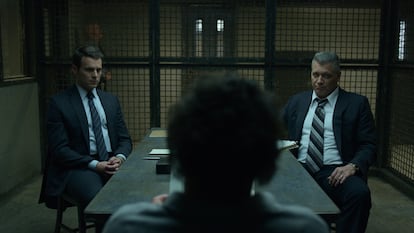Why are we fascinated by serial killers?
The creator of Netflix hit ‘Mindhunter’ analyzes a booming genre and explains that far from the Hannibal Lecter model, real multiple murderers are often disturbed and even boring individuals

Even though the second season of Mindhunter (Netflix) premiered in 2019, many fans still wonder if there will be further installments of the production, which followed the work of two FBI agents and a psychologist who formed the FBI’s Behavioral Science Unit in the 1970s. Directed and produced by David Fincher, the series is based on the memoirs of former agent John E. Douglas and writer Mark Olshaker. Using this material, as well as many interviews with real police officers, behavioral analysis experts and even the agents who captured serial killers like Green River and Ted Bundy, British playwright and screenwriter Joe Penhall fictionalized the lives of those whose task it was to try and delve into the minds of the most dangerous criminals.
As a child, one of Penhall’s friends fell victim to a serial killer, he revealed during an interview before a masterclass he recently gave as part of Serielizados Fest, an international television series festival in Madrid. Penhall believes that was the root of his fascination with these characters, which grew wider when he was 20 years old and working as a crime reporter. That is why, when actress and producer Charlize Theron bought the rights to turn the book into a series and the project fell into his hands, his goal was to demystify both the criminals and those who try to catch them. They wanted their killers, says Penhall, to be like the ones in real life: brutal, dysfunctional, damaged and very disturbed, unlike those glamorized, Silence of the Lambs-style murderers who are charming and profound and enjoy opera and good wine. As for the good guys, they wanted people who could become confused, nervous, even frightened, instead of the usual bold and heroic cops who always know exactly what to do.

Penhall’s experience as a journalist helped him study criminals from a different perspective, with more attention paid to the details of their daily lives. Not being part of the Hollywood scene, he was not interested in the countless movies and series that have been made about serial killers and policemen by people who grew up watching movies and series. Reality, he points out, is always different from what one sees on screen. He recalls, for example, reading the transcript of police interrogations of a murderer who killed five people in London when he was a reporter and finding it fascinating – albeit quite trivial and boring. That is when he started thinking that it would be interesting to write about criminals.
The image of the serial killer as charismatic and fascinating still persists in Hollywood, something which Penhall finds remarkable, as the only fascinating thing about serial killers, he points out, is how boring and normal they often are, and how regular people can somehow become deviant. Even if their underlying problems are interesting, that doesn’t make them fascinating themselves. Nonetheless, many series make iconic characters out of killers.
The public’s attraction to serial killers is undeniable. The latest hit to join this category is Dahmer, in which Evan Peters plays Jeffrey Dahmer, also known as the “Milwaukee Cannibal.” It was the second most-watched English-language series in its first 28 days in the history of Netflix, only surpassed by the fourth season of Stranger Things, according to data provided by the platform. But what do serial killers have that catch public attention to such an extent? For Penhall, it is a matter of branding: Jeffrey Dahmer has become a brand, like a Marvel character. Watching a series about him is as easy and enjoyable as watching a Star Wars or an Avengers movie.

Glamorizing the psycho
The plots of Mindhunter involve real killers, such as Ed Kemper, Dennis Rader, Charles Manson, David “Son of Sam” Berkowitz, William Henry Hance or Wayne Williams, with a huge list of murders to their credit, as well as real victims whose names were changed in the series. A risk of the works of fiction that deal with this type of character is that they could end up glamorizing the criminal – something that was not a problem for Penhall, as they are actually really horrible beings, he says. Charles Manson called a producer while he was still alive (he died in 2017 after spending almost half a century in jail) and left him a Christmas message in which he sounded exactly like what he was: a babbling psycho serial killer. However, if all you know is the bubble of movies and TV, when you write a murderer as a villain he will be nothing more than a character, a bad guy. Robert Harris (author of The Silence of the Lambs) may be a great writer, but Hannibal Lecter is an invention, Penhall emphasizes, no more real than Harry Potter.
As the conversation approaches its end, an obvious question comes to mind: should we forget, once and for all, about a third Manhunter season? Never say never, Penhall replies, but the fact is that Fincher loves making movies and that is much easier than working on 10 episodes of a Netflix series. Nonetheless, he has toyed with the idea of making more seasons; in fact, he has already written the outline of what could become five more installments of the series. In the fifth, he describes, Tench (Holt McCallany) and Holden (Jonathan Groff) become authors, go to Hollywood premieres, stop working as cops, become famous and even become consultants on a Hollywood movie. It was a very playful idea indeed, he concludes with a smile.

Tu suscripción se está usando en otro dispositivo
¿Quieres añadir otro usuario a tu suscripción?
Si continúas leyendo en este dispositivo, no se podrá leer en el otro.
FlechaTu suscripción se está usando en otro dispositivo y solo puedes acceder a EL PAÍS desde un dispositivo a la vez.
Si quieres compartir tu cuenta, cambia tu suscripción a la modalidad Premium, así podrás añadir otro usuario. Cada uno accederá con su propia cuenta de email, lo que os permitirá personalizar vuestra experiencia en EL PAÍS.
¿Tienes una suscripción de empresa? Accede aquí para contratar más cuentas.
En el caso de no saber quién está usando tu cuenta, te recomendamos cambiar tu contraseña aquí.
Si decides continuar compartiendo tu cuenta, este mensaje se mostrará en tu dispositivo y en el de la otra persona que está usando tu cuenta de forma indefinida, afectando a tu experiencia de lectura. Puedes consultar aquí los términos y condiciones de la suscripción digital.









































